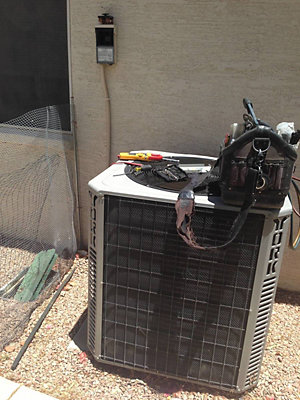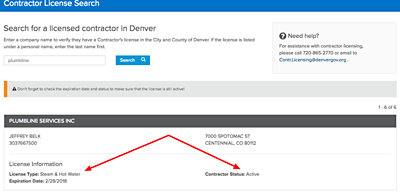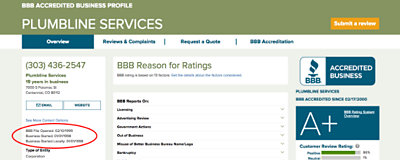7 Things to Look for in the Best HVAC Contractor in Denver, CO

Your HVAC system is arguably the most expensive and valuable system in your home. So, you shouldn’t trust just anyone to repair or install a new heating or cooling unit without some proper vetting.
But finding the best HVAC contractor in Denver can be a daunting task. What traits should you look for? Would you be able to spot a sketchy contractor when you see one?
To help you make the right choice, we’ll discuss 7 must-have characteristics for your next HVAC contractor.
#1: Must be licensed in the city and county of Denver, CO
You wouldn’t trust a doctor without a license to diagnose and treat you, right? Well, that’s the same mindset you should have when choosing an HVAC contractor.
Always ask to see a contractor’s license before they begin work. Or you can verify Denver contractor licenses yourself here.

Check to ensure a contractor’s licenses are valid and active.
Source: Better Business Bureau Website
Is a contractor being licensed that big of a deal?
Absolutely!
Consider this: HVAC repairs and installation require dealing with:
- Electrical components
- Gas lines
- Dangerous chemicals like refrigerant
You don’t want to put your family or home in danger by employing someone who isn’t properly trained to complete the job. Also, most HVAC warranties require that your system be installed by a licensed professional. Otherwise, the warranty is void.
#2: Must be insured and bonded in the city and county of Denver, CO
Even if an HVAC contractor is licensed, they may not be insured or bonded.
So, what does “insured” and “bonded” really mean?
Well, if a contractor is insured, it means that if a contractor damages your property (or even your neighbor’s property) or if they get hurt on the job, it will be covered by the insured professional. If your contractor isn’t insured and something happened, you would be held responsible for damages or hospital bills and can even be sued!
Check to ensure that your contractor has these types of insurance:
- Worker’s compensation
- Personal liability
- Property damage coverage
If a contractor is bonded, it means he has purchased a specific insurance policy that protects the homeowner. If the contractor fails to complete the job as promised, that surety bond provides financial compensation to the homeowner.
#3: Must be experienced
Check your contractor’s website and/or their profiles such as a Better Business Bureau profile to see how long they’ve been in business. You want a business that has been around for at least 5 years and won’t disappear from you when your systems act up.

Also make sure that your contractor is specifically experienced in the system you have or the job you need done. What good does 25 years of experience do for you when the tech has never performed the duct cleaning services you need?
Ask your contractor for a list of projects they’ve completed in the last year that are similar to your job.
#4: Must provide solid warranties
Imagine you hire a contractor to install a new furnace. Then, 6 months later, the furnace is already in need of major repair. You reach out to the contractor only to find that your warranty has expired, and you’ll have to pay out of pocket for labor.
Avoid that situation by asking contractors beforehand what kind of labor warranty they offer on installations and repairs. Make sure that your contractor stands behind their work by offering warranties that cover labor costs for the first several years following the installation.
#5: Must be available when you really need them
Choose a contractor that offers emergency service 24 hours a day. The worst thing that can happen is being stuck in the cold/heat over a long holiday weekend.
#6: Must have an excellent track record and reputation
Decade's worth of experience means nothing if a contractor’s past customers have nothing but unpleasant experiences to share.
Check your contractor’s review sites (like Google+, Yelp, FB, BBB, etc.) for an idea on the quality of their services, customer service, etc. You can also ask your contractor to provide references from people who recently used their services for similar jobs.
#7: Must offer written contracts
A written contract is basically legal protection for both you and your contractor and prevents any disagreements or confusion regarding the job at hand.
If your contractor doesn’t volunteer a written contract, ask them to write one up before the job. Beware contractors who don’t offer written contracts when asked.
Some things your written contract should include are:
- Contractor’s information (company name, license, insurance #)
- Overview of project, what needs to be done and who will perform the work
- Materials needed
- Permits needed and who will obtain them
- Payment due dates
- Warranty information
Also, beware HVAC contractors who offer estimates without first inspecting your home or system. For example, when getting a quote for an AC or furnace installation, reputable companies will first inspect your home to determine the unit size you need before offering price estimates.
Need help from a Colorado Plumbing, Heating, Cooling, or Electrical Specialist?
For your convenience, you can request an appointment in one of two ways:
- Call us at (303) 436-2525 for immediate assistance.
- Click on the button below to schedule your appointment online.
Related Reading
Join Our Email Newsletter
Receive updates, current news, promotions, and industry tips.
